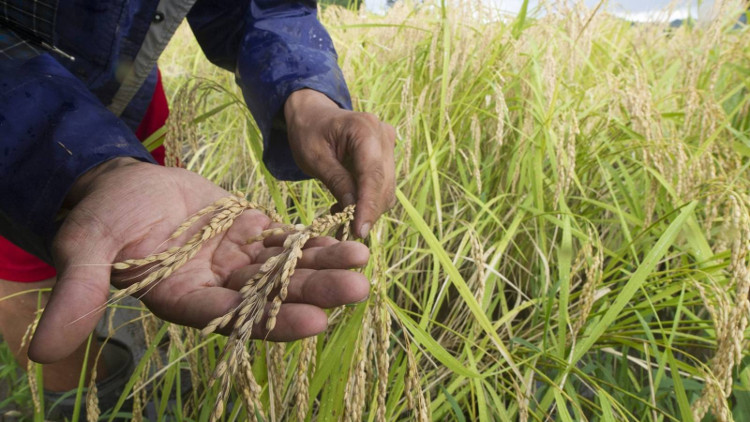Poor nutrient food due to global warming
In a study published Aug. 2, scientists said that the amount of carbon dioxide in the air would increase the amount of protein in essential foods such as rice and wheat, which threatens development. Physical and life expectancy reduction.
According to research published in the journal Environmental Research Letters, by 2050 there will be 150 million people worldwide are at risk of falling into protein deficiency directly related to the increase in atmospheric CO 2 .
The team led by scientists from Harvard University has conducted many experiments in large fields, in which food crops are placed in environments with higher concentrations of CO 2 than normal.
The results showed that with the increase of CO 2 from now to 2050, the protein content of barley decreased by 14.6%, in rice by 7.6% and in wheat by 7.8% while for potato west is 6.4%.

Japanese farmers work on a field in Chiba.(Source: EPA / VNA).
Then, scientists based on the United Nations' recommendations on nutrition to calculate the level of impact on those at risk of protein deficiency.
Not only does it affect the protein content, the increase in CO 2 in the atmosphere can cause important minerals such as iron and zinc in essential foods to decline and make global malnutrition become more and more common. more serious, because 76% of the world's population depends on these foods to get enough protein every day, especially in poor areas.
According to the study, if the amount of carbon dioxide increased as calculated, by the middle of the century, the population of 18 countries around the world would lose more than 5% of the protein needed in the daily menu due to the amount of protein in the rice and the essential food decreased.
The study also points out that the most affected areas will be sub-Saharan Africa and South Asia , where rice and wheat are indispensable foods in the daily menu.
The proposed remedial options include cutting CO2, diversifying daily diets , increasing nutritional content of essential foods or growing food crops that are less affected by CO2. .
This is the first study to assess the effect of global warming on protein content in foods.
The authors say they have yet to explain why carbon dioxide emissions could reduce protein levels or other nutritional components of foods, but this phenomenon may have consequences. Globally dangerous because without protein, physical development will be inhibited, disease is more and life will be reduced.
The most convincing hypothesis to date is that CO 2 causes an increase in the amount of starch in foods, reducing the amount of protein and nutrients.
- Climate change will cause billions of people to be deficient in nutrients because of poor food
- Global warming delays the next ice age
- Global warming can erase the Olympics since 2085
- Video: 135 years of global warming summed up for more than 30 seconds
- Scotland faces 'apocalypse' because of global warming
- The reason for the worsening winter is despite the global warming climate
- Melting ice will cause a global food crisis
- Cover the sun to block ... global warming
- 'Love food' will be more expensive due to climate change
- Where will the sea level be highest due to global warming?
- Nature helps curb the global warming
- Climate change seriously affects the poor
 Why do potatoes have eyes?
Why do potatoes have eyes? 'Tragedy' the world's largest carnivorous life: Death becomes ... public toilet
'Tragedy' the world's largest carnivorous life: Death becomes ... public toilet Tomatoes were once considered 'poisonous' for 200 years
Tomatoes were once considered 'poisonous' for 200 years Detecting microscopic parasites on human face
Detecting microscopic parasites on human face